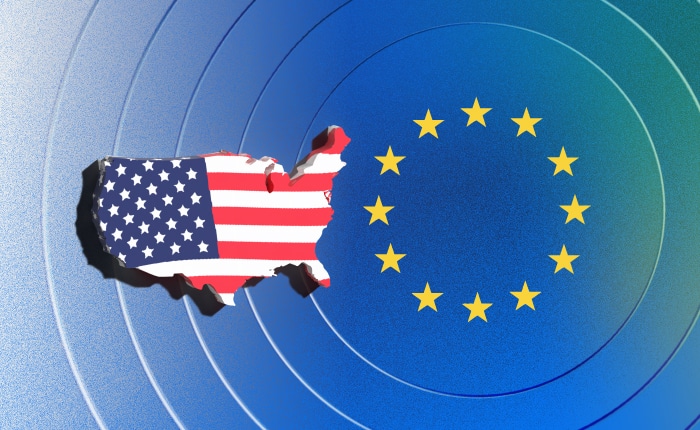European Union Regulators continue to issue strict privacy-related rulings and fines, and onlooking United States-based businesses are on alert. These developments are helping to clarify the General Data Protection Regulation’s (GDPR) nuances and complexities in real time.
Strict data privacy laws are not new to the EU: Regulations like the Data Protection Directive and the ePrivacy Directive predate the GDPR by more than 10 years. This points to a fundamental difference between how seriously Europe takes data privacy and the patchwork, state-based approach in the U.S.
Here’s what U.S. companies need to know about data privacy in the EU and what practices they should adopt to ensure compliance with Europe’s privacy laws and regulations.
Adhering to EU Data Privacy Regulations Helps Ensure Consumer Trust
Regulatory bodies often incentivize companies to embrace better privacy practices by threatening fines and settlements for noncompliance. Avoiding penalties and fallout from regulatory violations are just some of the benefits of understanding and adhering to EU data privacy regulations, but the greatest benefit is cultivating a sense of trust among customers.
Our research shows consumers trust and prefer to shop with companies that are transparent about their data privacy practices. In Europe, data privacy is a particularly high priority: Nearly a third of European consumers exercised their new privacy rights within the first month after the GDPR became effective, according to a Gartner survey.
Businesses that approach privacy intending to demonstrate their commitment to respecting customer data privacy concerns and values will be better prepared to move into the EU.
Data Privacy Tips for Companies Expanding to the EU
Align with GDPR guidelines and demonstrate your company’s commitment to data privacy with the practices below.
- Understand the EU’s Opt-In Consent Model: The GDPR requires businesses to obtain explicit, opt-in consent from users to collect and process their data. In the U.S., companies can acquire and process user data until users ask them to stop by opting out.
- Understand Your Legal Bases for Data Processing: Identify and communicate the data you’re processing for EU data subjects, and why. Conduct an internal audit to identify the types of data you handle and document each processing activity’s purpose. It’s key to understand and adhere to the GDPR’s six legal bases for processing data.
- Determine if You Need To Appoint a Data Protection Officer (DPO): DPOs serve as independent advocates for data protection within an organization and are responsible for ensuring compliance with data protection laws, among other tasks. According to the European Commission, your company requires a DPO “if its core activities involve the processing of sensitive data on a large scale or involve large scale, regular and systematic monitoring of individuals.”
- Consider Hiring an EU Representative: An EU Representative is required for businesses not based in the EU that process the personal data of EU residents. These representatives act as points of contact with European supervisory authorities for business data privacy practices. Comparatively, a DPO deals with the actual development and implementation of GDPR-compliant data privacy practices, and an EU Representative lives in the EU and relays communication and concerns to the business.
- Conduct Data Protection Impact Assessments (DPIAs): A DPIA is a GDPR-required privacy risk assessment that helps identify your business’s alignment with the regulation’s privacy principles and compliance requirements. DPIAs are necessary when processing activities present a high risk to a customer’s data privacy. They help assess the potential risks and impacts associated with data processing and identify measures to mitigate those risks.
- Conduct a Transfer Impact Assessment (TIA): When transferring personal data of EU residents outside the EU, companies must conduct a TIA to evaluate the data protection measures in the recipient country. A TIA may be conducted by either the controller (the body determining the purposes and needs of the data process) or the processor (the body actually processing the data).
- Establish Data Processing Agreements (DPAs) With Third-Party Vendors: If you engage third-party vendors to process personal data on your behalf, establish clear DPAs. These agreements outline the responsibilities of each party, establish the legal basis for data transfers, and ensure the protection of personal data. Failure to have sufficient DPAs on file may result in fines.
- Determine Requirements for Conducting Business in the UK: After leaving the EU in 2020, the UK adopted its own data protection law, the UK GDPR, that closely mirrors the EU’s GDPR. Familiarize yourself with the UK GDPR’s requirements to ensure compliance when conducting business in the UK.
Following these data privacy practices per GDPR requirements is beneficial for any company looking to expand to the EU. These tips will:
- Proactively limit the number of operational adjustments your company must make as you approach the European market
- Increase the likelihood of avoiding hefty fines and losing customer trust internationally
Customers prioritize privacy, and adopting strong, transparent privacy practices demonstrates your commitment to protecting the data of your customers and employees.
DataGrail Helps Ensure You’re Ready To Take Your Business to the EU
Our resources provide a broad look at the GDPR, including a glossary of terms and helpful product use cases. Explore our blog and glossary pages for deeper insights into data mapping and data subject access requests for GDPR compliance.
If you’re ready to start preparing for your EU expansion, DataGrail can play a pivotal role. Contact us to learn how our data privacy platform can help you.

